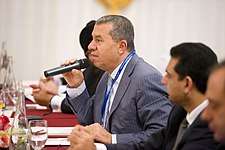Ras Al Khaimah Investment Authority
Ras Al Khaimah Investment Authority (RAKIA) was constituted by Emiri Decree No. (2)/2005 issued by the late Sheikh Saqr Bin Muhammad Al Qasimi in view of reinforcing the investment climate of this member of the United Arab Emirates (UAE) and promoting various economic sectors.[1] Its establishment was linked to a World Bank study and investment promotion event in May 2005 ("Invest and Live in Ras Al Khaimah")[2] initiated and pursued by the Swiss-Lebanese engineer Khater Massaad who was a long-time adviser to Sheikh Saud Bin Saqr Al-Qasimi, the creator of RAK Ceramics and the longtime CEO of RAKIA.

Sectors under development include industrial parks, education and technology, real estate, transportation, manufacturing and energy, as well as offshore operations and other investments.[3] Contrary to popular opinion, RAKIA is not a proper sovereign wealth fund (SWF) that would rely for example on steady income from oil or gas. Instead, RAKIA is an industrial licensing and promotion agency to attract investments into Ras Al-Khaimah.[4] The Government of Ras Al Khaimah as the owner or RAKIA raises funds from financial markets and passes this borrowed money on to RAKIA.
Services
As per the Emiri Decree No. (32) of 2012 issued by Sheikh Saud Bin Saqr Al-Qasimi, the scope of services offered by RAKIA includes:[1]
- issuing of all types of business licenses operating in the industrial parks and free zones belonging to RAKIA
- providing facilities for business (industrial land, warehouse, office space etc.)
- issuing licenses for offshore companies
Investments abroad
RAKIA investments abroad include operations in Georgia, notably shares in Poti Sea Port (directly through RAKIA in the UAE), in the Sheraton Metechi Palace Hotel in the capital Tbilisi (through its subsidiary RAKIA Georgia LLC), and the Poti Port Free Industrial Zone (through the subsidiary RAKIA Georgia FIZ LLC).[5] In both Georgian entities, 15 percent of RAKIA shares were alienated in 2011 to the UK based Manline Projects LLP owned by Georgian businessman Gela ("Zaza") Mikadze.[6] RAKIA's Sheraton Metechi Palace Hotel in the capital Tbilisi was sold to an Iranian investor in December 2011 but payments for this transaction have not yet been completed as of July 2013.
Controversies
Although Ras Al Khaimah is a poorer sheikhdom in the north of the UAE, Sheikh Saud bin Saqr Al Qasimi had instructed RAKIA to invest in Georgia a few years prior to his accession as ruler of Ras Al Khaimah in 2010. Against the background of Saud's dispute with his half-brother Sheikh Khaled bin Saqr Al Qasimi concerning each other's claims to the throne, these investments were interpreted as hedging against a possible failure of Saud's bid for leadership in Ras Al Khaimah. In the event of failure, Sheikh Saud had planned having large assets outside the UAE. That his succession was far from being certain is confirmed by the fact that it took a light military intervention of Abu Dhabi federal troops to ensure Saud's claim over the one of his elder half-brother Khaled when their father Sheikh Saqr bin Muhammad Al Qasimi died in October 2010. Once in power, Saud faced the impact of the Dubai financial crisis on public finances as well as homegrown discontent, notably in the form of the Al-Islah movement that demanded public participation and accountability in the UAE in general and in Ras Al Khaimah in particular. The Al-Islah movement represented the UAE variation of political uprisings in the region commonly summarized under the Arab Spring. The domestic challenges prompted Saud to adopt a general policy of selling all assets held abroad and not engaging in future investments outside Ras Al Khaimah.[4] One of the leaders of the Al-Islah movement, Saud's long-time legal adviser Muhammad Al-Mansuri (Mohammad Al-Mansoori), was tried among the so-called "UAE 94" political activists. On 2 July 2013 he was one of 68 government critics convicted by the State Security Court in Abu Dhabi of “plotting to overthrow the state”. He received a ten years jail term in a judicial process described by international observers as grossly unfair.[7]
Lack of funding for a projected Real Madrid resort island in Ras Al Khaimah
In June 2013, the highly advertised plans to build a 1 billion USD Real Madrid resort island in Ras Al Khaimah had to be cancelled due to the lack of funding. The project, announced only in March 2012, was supposed to be a joint venture between the Spanish football team, the government of Ras Al Khaimah and the Luxembourg-based RAK Marjan Island Football Investment Fund. RAKIA confirmed that the resort stood no chance of opening.[8] In addition to the financial deficiencies, the project had come under criticism in international sports circles, as Real Madrid was required by Ras Al Khaimah to remove the Christian symbol of the little cross from the crown atop their logo on all the project's promotional materials to conform with Muslim beliefs.[9]
RAK FTZ and RAKIA is now part of a larger group, RAK Economic Zone (RAKEZ)
See also
External links
References
- "Archived copy". Archived from the original on 2013-07-16. Retrieved 2013-07-31.CS1 maint: archived copy as title (link)
- "Archived copy". Archived from the original on 2008-12-05. Retrieved 2013-07-31.CS1 maint: archived copy as title (link)
- "Archived copy". Archived from the original on 2013-07-31. Retrieved 2013-07-31.CS1 maint: archived copy as title (link)
- "COVER STORY - RAK SPECIAL REPORT - The man who sold the world. - Free Online Library". Retrieved 2 December 2016.
- "Home". Retrieved 2 December 2016.
- National Agency of the Public Registry https://enreg.reestri.gov.ge/main.php?m=new_index&state=search
- "Archived copy". Archived from the original on 2013-08-01. Retrieved 2013-08-01.CS1 maint: archived copy as title (link)
- McGinley, Shane. "$1bn Real Madrid RAK resort 'indefinitely' on hold - ConstructionWeekOnline.com". Retrieved 2 December 2016.
- "Real Madrid make small but deliberate change to their crest for UAE resort island partnership". Retrieved 2 December 2016.